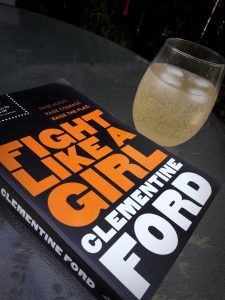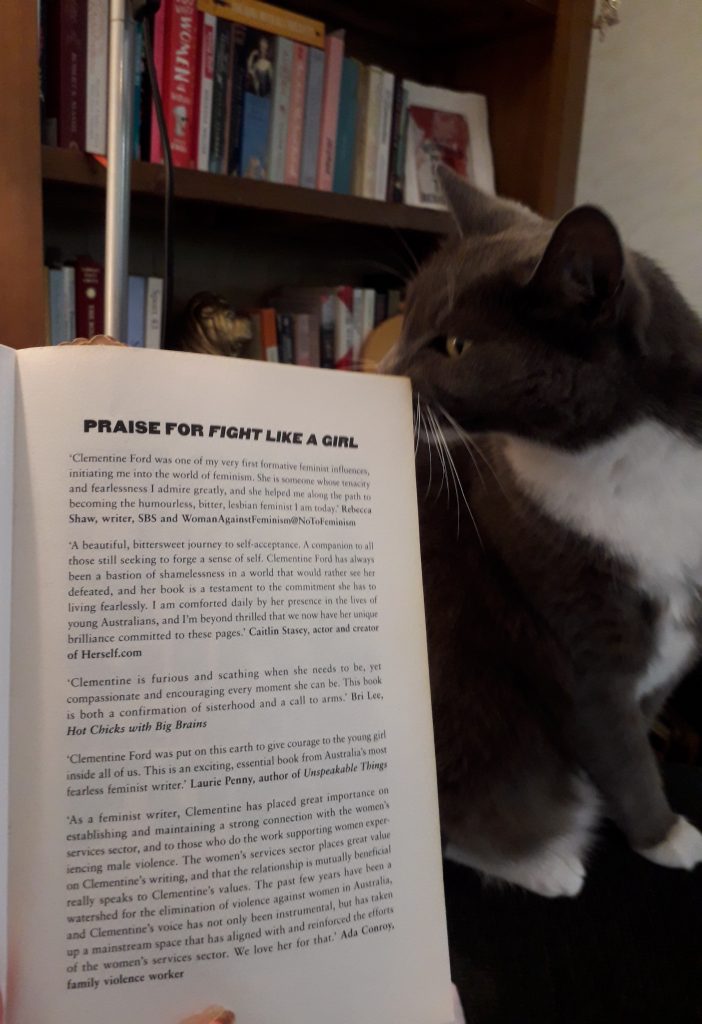I got given Clementine Ford’s Fight Like a Girl for my birthday, which was excellent because I’ve been wanting to read it for ages and it fits in the Rebel Girl Reads book challenge.
When I started doing Rebel Girl Reads I came up with the genius (lol) (that’s an ironic lol aimed at myself) idea of using gift tags as page markers, so that when I was finished I could easily go back and pull out important bits for blogging about.
The problem with this system is it relies on the idea that there will be discrete important pages or passages, and ignores the reality, which is that the whole thing is important and really you don’t want to spend time typing up quotes, you just want other people to magically get how important it is and go read it themselves.
I feel like this is probably going to happen a lot for me this year, considering my experience so far. I’ve only read four books for Rebel Girl Reads and all of them have been revelatory. And the list of ones I’m planning to add to my shelf makes me feel ridiculously excited. I know, what a massive nerd. I don’t even care.
only read four books for Rebel Girl Reads and all of them have been revelatory. And the list of ones I’m planning to add to my shelf makes me feel ridiculously excited. I know, what a massive nerd. I don’t even care.
In the past, I have been a bit afraid or wary of “unapologetic” feminists. In my head I associated them with all the words I now know as socialised causal misogyny – too brash, too loud, not doing the movement any favours, etc etc etc.
Clementine addresses all of these terms. She is loud, she is brash, and she is fucking unapologetic. And I’m grateful for it. I’m so fucking grateful for her intelligence and her bravery, because “the movement” needs it more than ever before.
If this book proved anything to me, it is just how much I’ve been gaslit by the patriarchy (also it explains where the term gaslighting comes from). Any time I’ve thought that something was wrong with society, I’ve been successfully convinced that I’m wrong, it’s all in my head, and if there’s something wrong with anyone, it was me.
This book made me feel like weeping because… it’s not all in my head. And while that’s good? It also means that things are really severely fucked up in the world.
Clementine calls the book “a love letter to the girls… To the troublemakers and the rebels, the women who are told they’re too loud, too proud, too big, too small. Or not enough of nothing at all.”
She addresses the feeling I have always had, that something is wrong but maybe it was just me.
‘A friend of mine once said to me that feminism helped her figured out a way of being a girl that doesn’t hurt… a lot of the time, being a girl in this world hurts. Before you are aware of it, it just presents as a persistent throb. A slow and steady sense that something isn’t quite right. You wonder if the world you’re experiencing is the same one that everyone else is living in. Do they see colours the same way you do? Do their sense work differently? Is there something wrong with you?” (p14)
She talks a lot about the way she’s been treated as an outspoken feminist, especially the heinous online threats of rape and death. She shares a lot of these and it’s hard going even to read as a bystander, so being the target must be horrific – though she says (heartbreakingly) that she’s used to it now and none of it bothers her.
“’Outspoken’ feminists – by which I mean feminists who dare to speak about their politics in any way, shape or form – incite the anger of people deathly afraid of women’s power, and whose only recourse against it is to try and nullify it by using the threat of male exclusion.
This is standard procedure. It’s seen as perfectly acceptable to accuse a woman of misandry and admonish her for the supposedly gargantuan crime of man-hating. This stereotype is used to control women because – as I’ve already mentioned – one of the worst things a woman can do is to consciously opt out of the apparently great privilege of enthusiastically sucking on patriarchy’s dick.” (p160)
I had to laugh out loud here. One of the greatest things about this book is how accessible and relatable it is. It’s exactly like how I imagine a conversation with her to be. Her language is coarse and strong and it’s really unusual to read something that doesn’t hold back like that. And it is totally appropriate to the subject matter.
“Women who assert our own right to self-determination pose a threat to men’s power. And if misogynists weren’t so dim and so obsessed with trying to shut women up, they would realise there is a deep and intense irony in trying to insult feminists by accusing us of not needing men. Like… no shit, dingus.” (p198)

Endorsed by Carina (and many others who actually know what they’re talking about)
I feel like I understand the levels and layers of oppression a little more now. A part of me, as a white Western woman, balks at the idea that I’m oppressed in any way. It sounds ridiculous. I have so many freedoms. But the oppression we experience is so entrenched and so insidious – that’s how the power is perpetuated. Because we don’t even know it’s happening half the time.
“women are more likely to shrink than we are to expand when men are present. This doesn’t necessarily mean men are wilfully oppressing us. In all honesty, they’re probably not even aware it happens. But as with so many things, what is seen cannot be unseen – and I have watched even as I, le boner killer extraordinaire, subconsciously adapt and modify my behaviour or conversation when confronted with the possibility a man might find it inaccessible or dull.” (p91)
She goes through the laundry list of insults that get leveraged at her – fat, hairy, lesbian, ugly – and responds and unpacks all of them – and how so many of them relate to patriachal ideals of beauty.
“It is necessary to keep repeating this, because perhaps reputation will convince the unconvinced of how insidious this feeling is: the pinnacle of women’s value is placed not just in her beauty, but in her willingness to work eagerly towards that beauty.
In a patriarchy, it isn’t enough simply to be aesthetically attractive; a woman must also show commitment to the idea of what it means to be attractive. She must be polite and deferential when necessary. She must be agreeable. She musn’t inspire feelings of anger or resentment, or challenge the status quo. And above all, she musn’t threaten masculine power.” (p199)
One of the best bits is where she talks about the softening of feminism in order to make it more palatable to a wider audience. How she, and many others, have taken time to acknowledge “the good guys” in the room. She relays a story about a feminist panel she spoke on, and how the first question from the floor following the talk was “How come there’s no men on this panel?”
“Women have been instructed so often to worry about what men will think about every single thing we do or say, every move we make and every thought we think, if we have to start practicing feminism like this we might as well just rebrand it ‘society,’ and be done with it. Instead of being brazen, unapologetic activists fighting for liberation, all too many women have now learned to pepper their politics with caveats, sentiments designed to reassure people that feminism is really a rather gentle kind of philosophy – a group of nice women doing nice things who would like equality if that’s okay with everyone else but who most definitely don’t pose a threat to the general order of things.
…
Because Not All Men, right? I mean, we’d hate to make them feel bad. ” (p214)
She gives a few pages to picking apart the work of White Ribbon in Australia, which was a revelation for me. I had no idea they were terrible. They’re a front for men pretending they’re doing good when they’re either doing nothing, or much worse.
I feel that this last thing I’m going to share (because otherwise I could go on forever) is particularly relevant to the current discussions around sexual assault that have been raised by the story about Aziz Ansari.
“I’m just going to throw this out there because, as far as provocative truth bombs go, it’s been ticking away for too long: this universal male decency we keep hearing about is largely a myth.
Sure, most men might not be bad. You’re probably not bad. But it takes more than ‘not being bad’ to be ‘actually good.’” (p226).
Can I just repeat that please? It takes more than ‘not being bad’ to be ‘actually good.
But Not All Men. I mean, we’d hate to make them feel bad.

Pingback: Writehanded: The nature of gendered abuse « The Standard